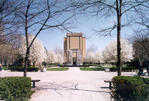
Art on Campus
Photography by Robert F. Ringel

| In the early 1940s, new art forms in sculptures appeared on the campus. The university inaugurated a beautification project to fill the many empty niches in the buildings on campus with sculptures. Seventeen sculptures were completed by Rev. John Bednar, head of the art department, and Eugene Kormendi, artist in residence and teacher of sculpture. The World War I portico in the east entrance of the Sacred Heart Church was completed in May of 1944 and the Grotto received its own piece of art, a three-sided drinking fountain carried out with relief depictions of Our Lord at the well. * |  |
|
A year ago Ralph Adams Cram (who later designed the South Dining Hall)
stated that the grotto is the best piece of art at Notre Dame. Aside from
its artistic value, many a student has found it the most inspiring place on
the grounds. If you neglected it during the month of the Blessed Virgin,
you still have a week in which to learn its beauties and its inspiration.
Drop down there after Holy Communion: call again before you go to bed at
night. Stand back far enough to see the dome and statue towering over it;
then approach and kneel before the statue. The girlish figure in white
built this school. On your knees thank the Blessed Virgin for Notre Dame.
The old boys who amount to something want to visit the grotto when they come
back here; you will in your own good time if you learn its secret while you
are here. -- John F. O'Hara, CSC, Religious Bulletin, 1 June 1925. If your guest should be non-Catholic, to make her feel at ease, introduce her to the Grotto first. That's probably where you'll go first anyway. -- Notre Dame Religious Bulletin, October 14, 1941.
|
© 2001 by Robert F. Ringel.
All rights reserved.























